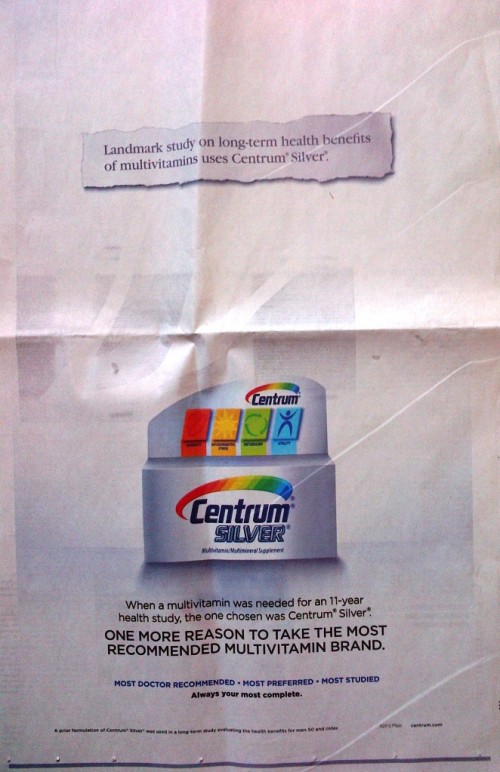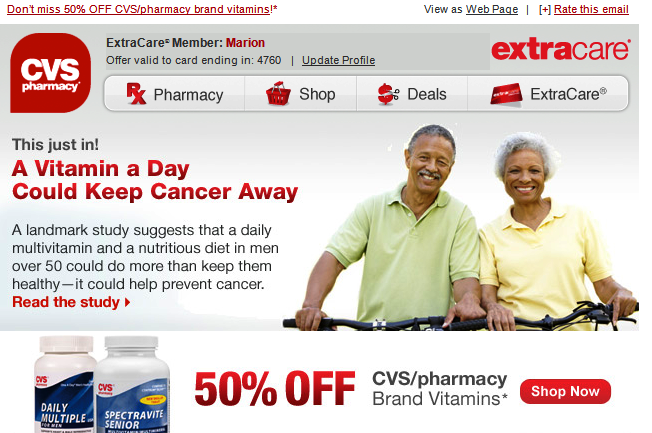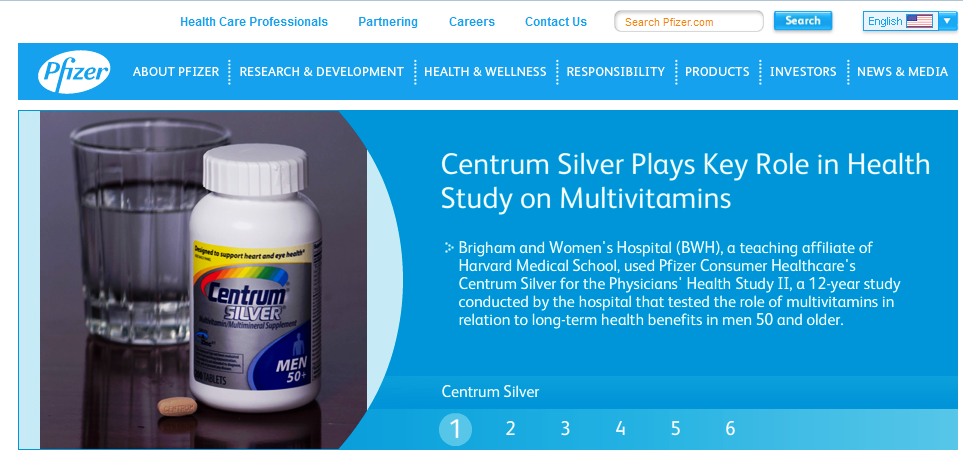Malden Nesheim and I wrote an editorial for the Annals of Internal Medicine that has just gone online, and is likely to elicit plenty of discussion. We comment on the highly conservative, evidence-based recommendations of the U.S. Preventive Services Task Force for taking supplements of calcium and vitamin D as a means to prevent osteoporosis.
Our commentary: “To Supplement or Not to Supplement: U.S. Preventive Services Task Force Recommendations on Calcium and Vitamin D.” Here’s what we said:
In this issue, the U.S. Preventive Services Task Force (USPSTF) plunges headlong into ongoing debates about whether healthy adults—those who show no signs of vitamin D deficiency or osteoporosis—should be advised to take combined supplements of calcium and vitamin D to prevent bone fractures and, if so, at what level (1).
In terse statements unlikely to settle the debates, the Task Force states first that insufficient evidence makes it impossible to determine how supplementation affects fracture incidence in men or premenopausal women. Next, it deals with postmenopausal women. For this group, the Task Force says that evidence is insufficient to assess the effects of daily supplementation with greater than 400 IU of vitamin D3 and greater than 1000 mg of calcium. The Task Force’s unambiguous conclusion: Supplementation at or below those levels does not prevent fractures. Because supplementation at or below 400 IU of vitamin D3 and 1000 mg of calcium seems to convey a slightly increased risk for renal stones, the USPSTF recommendation for postmenopausal women is also unambiguous: “do not supplement.”
The Task Force based these decisions on 2 commissioned evidence reviews and a meta-analysis (2 – 4). More recent data from the Women’s Health Initiative also are consistent with inconclusive findings, except among a subgroup of long-adherent supplement recipients who experienced a reduced risk for hip—but not total—fractures (5).
The Task Force’s recommendations must be interpreted in the light of ongoing disputes about the most effective method for assessing vitamin D deficiency, whether calcium and vitamin D supplements are needed by a large portion of the population, and what level of supplementation might best maximize benefits and minimize risks.
In 2011, after reviewing more than 1000 studies, the Institute of Medicine (IOM) concluded that vitamin D and calcium are indeed critical to bone health but their role in other diseases—cancer, heart disease, diabetes, immune function, and reproductive health, for example—remains uncertain. The IOM did not consider deficiencies of either calcium or vitamin D to be serious problems in the United States, except among certain population groups. Instead, because of widespread fortification and supplementation, the IOM was concerned about the possibility of adverse consequences from oversupplementation (6).
With risks as well as benefits in mind, the IOM established the average adult daily requirement for calcium at 800 to 1000 mg depending on age, the Recommended Dietary Allowance (the amount needed to meet the needs of about 97% of the population) at 1000 to 1200 mg, and the safe upper level of intake at 2000 to 2500 mg. Its corresponding recommendations for vitamin D were 400 IU, 600 IU (800 IU for older adults), and 4000 IU, respectively. The IOM viewed these levels as sufficient to maintain blood levels of 25-hydroxyvitamin D at or above 20 ng/mL, a level it considered adequate to meet population-based needs regardless of amounts synthesized as a result of sun exposure.
Vitamin D, of course, is not a vitamin in the usual sense. It is a hormone produced in response to the action of sunlight on skin. Like other hormones, vitamin D has multiple roles in the body, not all of them well-understood. Vitamin D supplementation, therefore, must be considered a form of hormone replacement therapy. As such, it raises all of the questions about efficacy, dose, and side effects currently asked of such therapies.
In that light, the 2011 recommendations of the Endocrine Society deserve special scrutiny (7). The Society approaches questions about vitamin D from a standpoint quite different from that of the IOM. It appointed its own task force to make recommendations based on the premise that vitamin D deficiencies are common among all age groups. The Society prefers 30 ng/mL of 25-hydroxyvitamin D as the target level for maximum benefits. By that criterion, virtually all U.S., Canadian, and European adults are deficient in hormone vitamin D and require daily supplements of 1500 to 2000 IU. For adults with demonstrated deficiency, the Society recommends treatment with 50 000 IU of the hormone once a week or daily supplementation of 6000 IU for 8 weeks, followed by 1500 to 2000 IU for maintenance.
This clinical endocrinology perspective differs from the nutrition science perspective of the IOM committee, whose members tend to interpret studies of single nutrients within the context of the diet as a whole. From this standpoint, the amount of hormone generated by the action of sunlight on skin (which ought to be more than adequate for people who spend time outdoors in latitudes as far north as Boston) is crucial to decisions about supplementation. The IOM and Endocrine Society debated their conflicting perspectives in an exchange published in 2012 (8 – 9). The insufficiency of research to resolve such arguments has permitted vitamin D to become “trendy.” It is advertised on boxes of fortified cereals, has its own prosupplement advocacy group, and generates millions in annual supplement sales (10).
The USPSTF’s recommendations can be understood as an attempt to clarify the present situation with respect to one specific outcome of supplementation. In doing so, its recommendations have a substantial advantage. They depend on hard end points—fractures—rather than on blood levels of 25-hydroxyvitamin D, at best an indirect measure of vitamin D adequacy. The USPSTF uses the same precautionary approach as did the IOM. In the absence of compelling evidence for benefit, taking supplements is not worth any risk, however small.
A previous attempt to sort through the various claims for vitamin D noted an urgent need for further research to answer fundamental questions about the risks and benefits of sun exposure, fortification, and supplements, and the hormone’s role in body functions beyond bone mineralization (11). The USPSTF plans to publish further recommendations on the role of vitamin D in cancer prevention. When it does, we hope it will keep in mind the value of making a single recommendation about vitamin D and calcium supplementation that will encompass all potential benefits and risks. Multiple recommendations by condition confuse practitioners and the public. While we wait for the results of further research, the USPSTF’s cautious, evidence-based advice should encourage clinicians to think carefully before advising calcium and vitamin D supplementation for healthy individuals.
References
1 Moyer VA; U.S. Preventive Services Task Force. Vitamin D and calcium supplementation to prevent fractures in adults: U.S. Preventive Services Task Force Recommendation Statement. Ann Intern Med. 2013. [Epub ahead of print]
2 Cranney A, Horsley T, O’Donnell S, Weiler H, Puil L, Ooi D, et al. Effectiveness and safety of vitamin D in relation to bone health. Evid Rep Technol Assess (Full Rep). 2007:1-235. [PMID: 18088161]
3 Chung M, Balk EM, Brendel M, Ip S, Lau J, Lee J, et al. Vitamin D and calcium: a systematic review of health outcomes. Evid Rep Technol Assess (Full Rep). 2009:1-420. [PMID: 20629479]
4 Chung M, Lee J, Terasawa T, Lau J, Trikalinos TA. Vitamin D with or without calcium supplementation for prevention of cancer and fractures: an updated meta-analysis for the U.S. Preventive Services Task Force. Ann Intern Med. 2011;155:827-38. [PMID: 22184690]
5 Prentice RL, Pettinger MB, Jackson RD, Wactawski-Wende J, Lacroix AZ, Anderson GL, et al. Health risks and benefits from calcium and vitamin D supplementation: Women’s Health Initiative clinical trial and cohort study. Osteoporos Int. 2013;24:567-80. [PMID: 23208074]
6 Institute of Medicine. Dietary Reference Intakes: Calcium, Vitamin D. Washington, DC: National Academies Pr; 2011.
7 Holick MF, Binkley NC, Bischoff-Ferrari HA, Gordon CM, Hanley DA, Heaney RP, et al; Endocrine Society. Evaluation, treatment, and prevention of vitamin D deficiency: an Endocrine Society clinical practice guideline. J Clin Endocrinol Metab. 2011;96:1911-30. [PMID: 21646368]
8 Rosen CJ, Abrams SA, Aloia JF, Brannon PM, Clinton SK, Durazo-Arvizu RA, et al. IOM committee members respond to Endocrine Society vitamin D guideline. J Clin Endocrinol Metab. 2012;97:1146-52. [PMID: 22442278]
9 Holick MF, Binkley NC, Bischoff-Ferrari HA, Gordon CM, Hanley DA, Heaney RP, et al. Guidelines for preventing and treating vitamin D deficiency and insufficiency revisited. J Clin Endocrinol Metab. 2012;97:1153-8. [PMID: 22442274]
10 Supplements stand out as 2008 sales bright spot for U.S. nutrition industry. Vitamins: D still shines. Nutrition Business Journal. 2009;14(6/7):5. Accessed athttp://newhope360.com/research-and-insights/supplements-stand-out-2008-sales-bright-spot-us-nutrition-industry on 15 February 2013.
11 Brannon PM, Yetley EA, Bailey RL, Picciano MF. Overview of the conference “Vitamin D and Health in the 21st Century: an Update”. Am J Clin Nutr. 2008;88:483S-490S. [PMID: 18689388]
Here’s the first objection:





